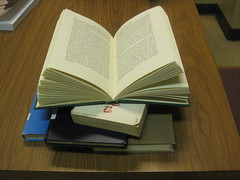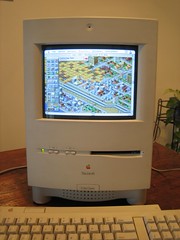All thought is mediated by tools. Right now I am writing this post on a computer, it has a 15 inch monitor, I’m using google docs, I’m writing text, that text is in the English language, I will copy and paste this into our instance of WordPress. The computer, the monitor, google docs, using text, that text being English, publishing through WordPress: everyone of those things is playing a mediational role in my thinking and acting. When I use the word mediational here I am specifically drawing on Anthropologist James Werstch‘s (who is largely drawing on the work of Vygotsky and Bakhtin) usage. These ideas are probably best explained in his book Mind as Action. Each element in that tool chain, from google docs to the English language, will leave it’s imprint on both the shape of my thoughts and their presentation to you. Sure, we are all cyborgs, but only in the strictest possible sense in that, as cognitive philosopher Andy Clark deftly demonstrates, just about everything we do is tool use. If I close my eyes, even my hands are tools that I am using as part of this process. When I use my fingers to count they are tools. When I do long division in my head and carry the one I am using a tool that I have internalized in my mind. Almost everything in life ends up being a tool we bend to use for thought. This is all to point to the fact that all historical thought, all historical ideas, are similarly mediated through a set of tools.
Wait isn’t this a blog about videogames?

My apologies, yes this is a blog about history and games. With that said, I wanted to front-load that description to dig into some issues that have emerged in some of the posts on this blog which have got me thinking a lot about what simulation and modeling of the past means.
In Seeing like Sim City Rob, discussing Galloway, suggested that getting deep into a simulation game has a “de-historicizing effect.” Specifically that “Mastering the simulation game involves a journey away from reality towards abstraction, away from history towards code.” This prompted me to reflect a bit more on what exactly we think would count as “historicized.” To what extent could we similarly claim that getting deep into history as written stories about-the past similarly de-historicizes the past into a series of plot points. Rob does an excellent job at getting at some of the important problems games and simulations bring as representations of the past. Now, when we step back and reflect on the problems that all modes of representing the past bring with them I think there might be something more liberating about the fact that each tool for thought brings its own unique set of weaknesses.
Modes of representing the Past are not clear containers
Sometimes when we talk about flaws in the models of simulations it feels like it’s taken for granted that the new media is the thing with imperfections, and that the status quo media, linear text, is ideology free. On the other side, there are evangelists and boosters for new media who make it sound like these new tools are going to bring about the singularity. That simulations will allow us to understand the world with a whole new kind of clarity. I would posit that both kinds of tools, text and simulation, are not clear containers of information. Each brings it’s own different kinds of distortions into our ability to understand the past through them.

Linear narratives have problems as tools for thought. The history of the world does not have a beginning middle and end. When you put it in a book, or tell someone a story about it, or any subsection of that history it has a beginning middle and an end by necessity. The world as experienced is a crazy mess. It’s that thing that’s happening now, when you look around the room you get as close as you can to touching it. But again, your body, your senses, are tools you are using to understand the moment. They are not the moment. Even our understanding of the moment is mediated by our tool set. History is an attempt to understand those moments in the past by triangulating evidence. But it is not simply evidence that needs to be triangulated. The modes for representing the past have their own baggage that we need to compensate for as well.
Another Lens Like Tool
I believe text and simulation are an important class of tool. They are lens-like-tools through which we can represent models and evidence. Linear narrative is a way to make sense of the traces of the past. What I think is exciting about simulations is that they are a fundamentally different way to make sense of traces of the past. Simulations are not better, they just (thankfully) have a different set of ideological problems that they bring to bear on representing the past.
I am excited about more people in history getting excited about simulation because it is a new interpretive frame to put into our toolkit for making sense of the past.
Literacy is Becoming Aware of The Pitfalls

Irrelevant of our desires, we need to start making the world simulation literate. In Simulation and it’s Discontents Shery Turkle tells us about a 13 year old SimCity player who told her about the “Top Ten Rules of SimCity.” One of the those rules was that “raising taxes leads to riots.” Now, if the adolescent had simply understood this as a rule in the model, it would be fine, but Turkle insists that the adolescent did not understand that the simulation was a simplification. Turkle claims that this adolescent had uncritically extrapolated a set of rules she used to understand society from SimCity. The claim is that the 13 year old did not understand the game as a model or a toy but instead saw it as a kind of direct representation of the world. In a world increasingly dependent on simulation as basis of knowledge it is important for us to begin to become literate.
With this noted, we don’t do a great job of getting at the problems with text, and these problems have been around for a very long time. In general, people think of history as what-happened-in-the-past and history as the-stories-we-tell-about-the-past as the same thing. This is to say that we haven’t done a good job at getting people to understand that the existing mediums we use to represent the past are not value free. Importantly, I think setting these two ways of representing the past in dialog may be a way to get at both literacy problems. The juxtaposition might help illustrate the pitfalls of each.

I recently gave a lecture to one of my classes about Digital Literacy, Marshall McLuhan and understanding biases that are built into media. I think that we often forget that even text, speech and gestures are, in some sense, mediated forms of communication. This article does a good job of situating us in a position where we can get a clearer perspective of how media like games and simulations influence the way that information and ideas are presented. I might have to use it next semester…
Very glad someone wrote the above post, you may also be interested in the writings on external cognitive artefacts (artifacts) by Australian philosopher Kim Sterelny.
Archaeologists and *digital* humanists I have met sometimes say build virtual models yet the book (their book) must always be the final authority. Even if books are difficult to update, miss out vital information that you gain from personal conversation with the author, and are often written in a way designed to impress rather than to enlighten. Most importantly, nonfiction books are often read by the people who least need (but most want) to read them.
You’d be interested in Medieval Mystery plays -no, seriously- They ran for 300 years, took over 24 hours to perform. Interactive theatre & role play as core of culture FTW! Performers drawn from community, audience taking key role as ‘humanity’, acting out narrative of the world as they understood it…
Useful reminder that post-modernist isn’t the only way to be. In many ways it seems that popular culture is echoing post-structuralist thought and arts forms that expose the methods of their own creation (Making of bits of DVDs, Dr Who Confidential) or that ARE the methods of their own creation (Games’s rules generate the experience- the rules are in many ways the art) have been becoming more popular over the last few years.
I don’t trust the illusion. Show me how it works. Let me make & remake it myself. Let me watch it a second time round and look for the strings.
But the mystery plays ran continuously for over 300 years across England & France. They embedded the idea that the way things were in the play-world was inevitably the way they were in the broader world. That the world DID have a pre-scripted beginning, middle and end.
In essence- I agree. Awesome stuff. But watch out for the latent linear narrative of our ascendancy through science…
http://en.wikipedia.org/wiki/Mystery_play